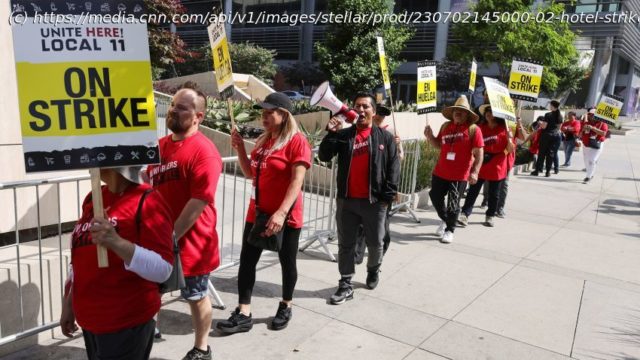Array
Some very famous faces are once again less than a day away from hitting the picket lines as the union representing about 160,000 actors prepares to possibly go on strike against major studios and streaming services.
The current contract for the Screen Actors Guild-American Federation of Television and Radio Artists (SAG-AFTRA) expires at 11:59 pm PDT Wednesday. The union faced a previous strike deadline on July 1, only to announce an 11th-hour contract extension. But nearly two weeks that followed haven’t produced any kind of breakthrough to avoid a strike.
The final day of talks will include a federal mediator, which studio management and streaming services’ executives requested late Monday. The actors union agreed but made clear that it was not willing to grant another extension and that if the final day of talks does not produce a last-minute deal, it will go on strike.
“We are committed to the negotiating process and will explore and exhaust every possible opportunity to make a deal, however we are not confident that the employers have any intention of bargaining toward an agreement,” said the union statement.
The Alliance of Motion Pictures and Television Producers (AMPTP), which is negotiating on behalf of the studios, includes Amazon
(AMZN), Apple
(AAPL), CBS
(VIAC), Disney
(DIS), NBC Universal, Netflix
(NFLX), Paramount Global, Sony
(SNE) and CNN parent company Warner Bros. Discovery. It did not have a comment about the 11th hour request for mediation or what it hoped would be accomplished.
Union anger at mediation request
The union was clearly angered by the last-minute request for mediation. It said there were published reports in trade publications about the AMPTP’s desire to have mediation even before the request was made to union negotiators at the bargaining table.
“The AMPTP has abused our trust and damaged the respect we have for them in this process. We will not be manipulated by this cynical ploy to engineer an extension when the companies have had more than enough time to make a fair deal.
The Federal Mediation and Conciliation Service is a government agency set up to try to prevent strikes by bringing two sides together. Its site says its mediators can become involved when both labor and management request help. But the federal mediators have no power to force one side or the other to accept the other side’s bargaining position, or to even order another contract extension.
But mediators are typically brought in long before the final day before a contract expires and strike is due to start.
“I think it’s too little, too late. It’s going to take an outside party several weeks to get his or her arms around these issues,” said Tom Nunan, a lecturer at the UCLA School of Theater, Film and Television, as well as a film producer and writer.
Another expert said the union likely only accepted the offer of mediation to remove a management talking point that the union wasn’t interested in reaching a deal.






